 What if Jesus came back today? That’s the premise of Mark Millar and Peter Gross’ 2004 mini-series entitled Chosen from Dark Horse. I picked up this 3-issue mini at my local library and have been wanting to read it for quite some time. I have always been fascinated with the life of Jesus, not just because I am a Christian, but because whether or not you believe him to be the Son of God or Savior of the world, Jesus, as a historical figure, is still pretty fascinating.
What if Jesus came back today? That’s the premise of Mark Millar and Peter Gross’ 2004 mini-series entitled Chosen from Dark Horse. I picked up this 3-issue mini at my local library and have been wanting to read it for quite some time. I have always been fascinated with the life of Jesus, not just because I am a Christian, but because whether or not you believe him to be the Son of God or Savior of the world, Jesus, as a historical figure, is still pretty fascinating.
Millar explores the question I started with: What if Jesus came back today? For those of you who may not be familiar with Christian theology and faith, the orthodox Christian belief is that after Jesus was crucified, then resurrected, he ascended into heaven, leaving the work of the development of the church and the spreading of the gospel (“good news”) to his followers. However, many Christians believe that Jesus will come once again to straighten out the world, to judge the righteous from the unrighteous, and to establish a kingdom here on earth. There are countless theories on how this might happen, ranging from the sky opening and Jesus riding down on a horse, or a cloud or a horse-shaped cloud, or some such dramatic scene, to a more sublime second coming, in which Millar explores. Much of what is called eschatology (or study of the “end times”) comes from the last book in the Christian Bible, the Revelation to John.
Chosen begins with the character of Jodie Christianson, a twelve-year-old boy in Illinois. Note the initials as well as the last name. The narrator is the Jodie of the future, reminiscing about how he first realized who he is called to be. The first tip-off for Jodie is that he walks away unscathed by a truck that literally lands on top of him. Then he begins to ask questions about how such a miracle could happen. He is then visited by a mysterious woman who plants the seed that he may have a divine calling.
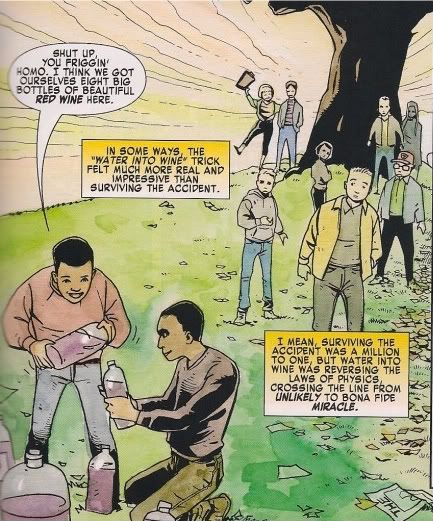 As his story progresses, Jodie begins to test his theory that he might be the returned Savior. He is told that he was born to a virgin mother (i.e. the Virgin Mary), he mysteriously knows facts about history and is soon stumping all of his teachers (i.e. the 12-year old Jesus in the Temple), he can heal people (i.e. Jesus rubbing mud in the eyes of a blind man), and he can even turn water into wine (i.e. Jesus at the wedding at Cana). Most of his friends and the townspeople begin to believe that Jodie is special. That is, all but one.
As his story progresses, Jodie begins to test his theory that he might be the returned Savior. He is told that he was born to a virgin mother (i.e. the Virgin Mary), he mysteriously knows facts about history and is soon stumping all of his teachers (i.e. the 12-year old Jesus in the Temple), he can heal people (i.e. Jesus rubbing mud in the eyes of a blind man), and he can even turn water into wine (i.e. Jesus at the wedding at Cana). Most of his friends and the townspeople begin to believe that Jodie is special. That is, all but one.
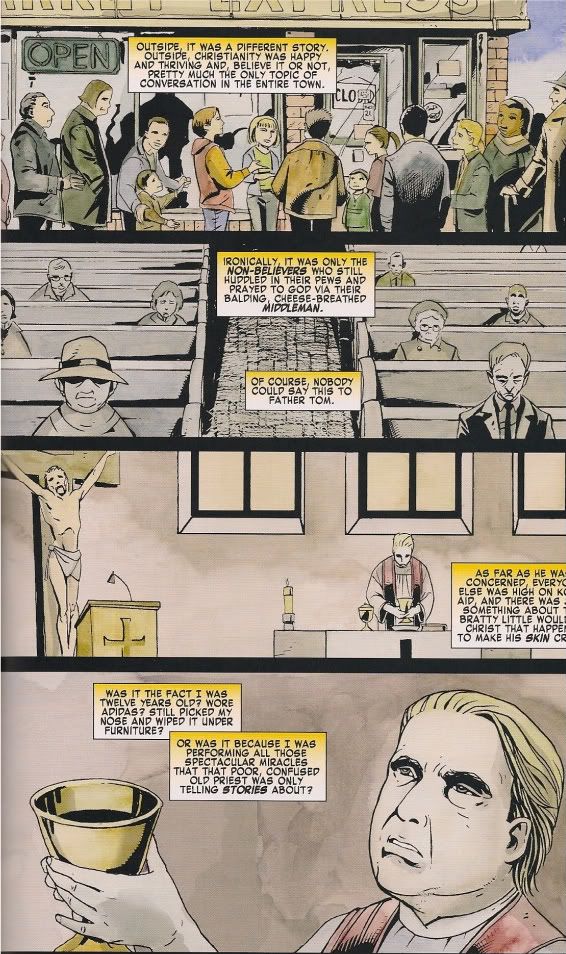 Jodie’s foil is Father Tom O’Higgins, who is extremely doubtful (i.e. “doubting” Thomas, the disciple), despite the fact that he’s a Catholic priest. It is in this relationship where the story of Jodie and the story of Jesus parallel very closely. In the Gospels, the people who just don’t seem to accept Jesus are the religious and faithful, which is very ironic. In the same way, everyone seems to believe in Jodie, except the ones who might be more religiously inclined. Father Tom epitomizes this, hoping to keep Jodie quiet.
Jodie’s foil is Father Tom O’Higgins, who is extremely doubtful (i.e. “doubting” Thomas, the disciple), despite the fact that he’s a Catholic priest. It is in this relationship where the story of Jodie and the story of Jesus parallel very closely. In the Gospels, the people who just don’t seem to accept Jesus are the religious and faithful, which is very ironic. In the same way, everyone seems to believe in Jodie, except the ones who might be more religiously inclined. Father Tom epitomizes this, hoping to keep Jodie quiet.
Eventually, Father Tom asks for a sign to prove that Jodie is who he thinks he is. Jodie miraculously heals Father Tom’s dog in a very dramatic way, and he becomes a believer.
However, like many of Millar’s books, this story has a very interesting twist. Once the characters, and the readers I might add, start to believe that this regular kid who is very human despite his divine abilities, might be the returned Jesus Christ, we find out a very dark secret. If you don’t want to be spoiled, you may wish to stop reading.
In the end, Jodie is revealed to be not, in fact, the returned Jesus, but actually the incarnate Anti-Christ. The series does have a dark tone throughout, so while I didn’t see this coming, when going back and looking at it, it made sense. Jodie’s parents are gaunt and deathly. Jodie’s miracles don’t inspire much joy or love, rather they are characterized as being divisive. There is a sinister subplot of Jodie going to live with his “real father” also known as Satan, which in the end he does. Finally, Jodie himself, while very human, doesn’t seem very Savior-like.
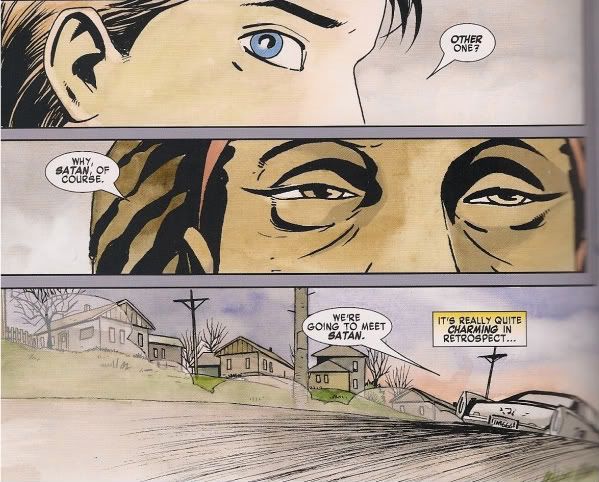
And yet, that is Millar’s point. There is a fine line between Christ and Anti-Christ, between divine and human, and Millar points this out well. What one person may think as good and miraculous, could in fact turn out to be the epitome of evil.
This has a lot to say about the ambiguity of good and evil. By playing with the theological concepts of Jesus Christ’s return and the coming of an Anti-Christ, which is also a belief widely held by many Christians, and is explored in the Revelation to John, Millar opens the door for much theological reflection.
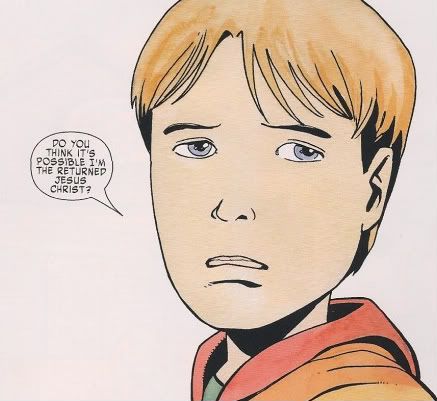 1. Would we know Jesus if we saw him today? In the 1990s Joan Osborne sang, “What if God was one of us? Just a slob like one of us? Just a stranger on the bus, trying to make his way home?” The concept of the incarnation, or God becoming human, is interesting to think about when considering the second coming. This is also true of the incarnation of an Anti-Christ, which Hollywood has played with in movies such as The Omen (1976 & 2o06) and Rosemary’s Baby (1968). However, Millar paints a subversive picture in posing the question of the Anti-Christ looking very similar and acting very similar to Jesus Christ. The Greek word ἀντίχριστος (“antichrist”) could mean “opposite of Christ,” but also has the connotation of “in place of Christ,” which is exactly how Jodie’s destiny begins to manifest itself.
1. Would we know Jesus if we saw him today? In the 1990s Joan Osborne sang, “What if God was one of us? Just a slob like one of us? Just a stranger on the bus, trying to make his way home?” The concept of the incarnation, or God becoming human, is interesting to think about when considering the second coming. This is also true of the incarnation of an Anti-Christ, which Hollywood has played with in movies such as The Omen (1976 & 2o06) and Rosemary’s Baby (1968). However, Millar paints a subversive picture in posing the question of the Anti-Christ looking very similar and acting very similar to Jesus Christ. The Greek word ἀντίχριστος (“antichrist”) could mean “opposite of Christ,” but also has the connotation of “in place of Christ,” which is exactly how Jodie’s destiny begins to manifest itself.
I tend not to be as literal about the events depicted in Revelation, seeing Christ’s second coming as more spiritual than physical. Jesus spoke of the Kingdom of God being a present reality, close at hand, if only we all agree to make it so. The Revelation to John was, by most scholarly accounts, not written to be taken literally, as it was a vision, or dream, of the author. Most of the book deals with metaphors and was written to be a sign of hopefulness to the persecuted Christians of the first century. The “Anti-Christ” may or may not be an actual persona that is opposite of Christ, but might point to those who were simply against the early Christian faith altogether. By that rationale, we might all be anti-Christs at some point until we begin to believe. I personally believe that the opposite is also true: when we believe, when we love, Christ is making himself known in the world and is returning in small ways in the hearts and actions of people who truly love. If we all could commit to putting aside our judgments and hatred, perhaps Christ could come back in the form of all of us living in peace and unity.
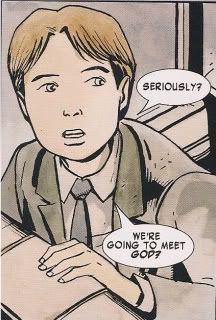 2. Chosen also illustrates the difficulty between the traditionally easy job of distinguishing good from evil. As a matter of ethics, what may seem good for one person may very well be evil to another. This is shown in the dichotomy between Jodie and Father Tom. What Jodie believes is good and holy, Father Tom thinks is hogwash. For Tom, putting oneself in the place of Christ is sinful and wrong. And yet, the reader is drawn onto Jodie’s side and, at least from my perspective, I was hoping that Jodie would be the returned Christ. Despite his rough edges, I was sympathetic to him, and ultimately, as the reader, I was deceived. Chosen begs the questions: can we really discern the difference between good and evil?
2. Chosen also illustrates the difficulty between the traditionally easy job of distinguishing good from evil. As a matter of ethics, what may seem good for one person may very well be evil to another. This is shown in the dichotomy between Jodie and Father Tom. What Jodie believes is good and holy, Father Tom thinks is hogwash. For Tom, putting oneself in the place of Christ is sinful and wrong. And yet, the reader is drawn onto Jodie’s side and, at least from my perspective, I was hoping that Jodie would be the returned Christ. Despite his rough edges, I was sympathetic to him, and ultimately, as the reader, I was deceived. Chosen begs the questions: can we really discern the difference between good and evil?
3. Jodie is not your typical divine being. For generations, scholars have been trying to explain who Jesus was and how he, also, was not your typically divine being. The doctrine of incarnation, that God became human in order to fully connect with us, traditionally means that Jesus was both fully human and fully divine. This is a great mystery in the Church. But if you take it to its logical conclusion, Jesus was fully God, but also fully human. Jodie exhibits both of these characteristics as well, as he curses and smokes and looks at pornography, not because he’s evil, per se, but because he’s fully human. We tend to place Jesus on the more divine side of the fence, thinking that he lived as a human, yet was somehow immune to human vice. Perhaps Millar is suggesting that in his time and culture, Jesus might not have been as saintly as we might think. In non-canonical texts of the first century, there are numerous accounts of what Jesus was like as a boy. In the “Infancy Gospel of Thomas,” Jesus struggles with his new found godlike abilities. In one scene, a boy runs into Jesus and Jesus responds by zapping him to death. A human emotion is met with a supernatural and divine response. While these are considered legends today, they do compare quite closely with the figure Millar portrays in Jodie.
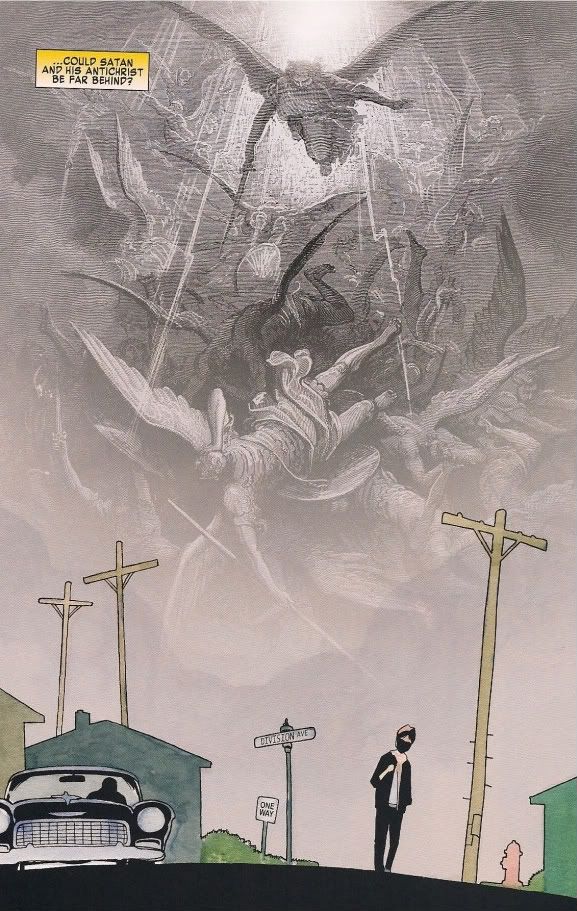 I think we all want Jesus to be like us, and somehow it’s comforting to know that Jesus might have felt and struggled with the same things I do as a human being–heartbreak, anger, jealousy, loneliness, and so forth. I think that’s why I became so sympathetic to Jodie’s character. I want Jesus to have some rough edges because I have some too; and if he does, then there is some hope for me, too.
I think we all want Jesus to be like us, and somehow it’s comforting to know that Jesus might have felt and struggled with the same things I do as a human being–heartbreak, anger, jealousy, loneliness, and so forth. I think that’s why I became so sympathetic to Jodie’s character. I want Jesus to have some rough edges because I have some too; and if he does, then there is some hope for me, too.
However, with the revelation that Jodie is actually the Anti-Christ, the story became much less interesting to me. Of course the Anti-Christ would act the way Jodie does! It all made sense. I wanted to see Millar’s Jesus as a real struggle between that humanity and divinity, and while he did, the final revelation jarred me.
While the ending didn’t make me happy, per se, I still recognize the genius of Millar’s storytelling here. The fact that I was drawn in so well to this character, only to find out who he truly was, was a remarkable twist. Millar has said that he hopes to continue Jodie’s story, as this is the first of a trilogy of American Jesus books. Perhaps there will be redemption for Jodie yet.
Jeff Jackson
jeff@comicattack.net



Wow, this sounds fantastic. I’ve got to pick this up. Good column FJ.
Thanks Billy. I like all of Millar’s stuff. It’s definitely worth picking up. I hope to see him continue the trilogy.
ahem…a spoiler alert would have been nice man! lol otherwise a fantastic article
I did put a spoiler alert in there: “If you don’t want to be spoiled, you may wish to stop reading.”
well to a guy that only got a few hours sleep that wasn’t bright or big enough buddy! lol
Haha! Sorry, ‘Speech! I’ll highlight it next time. LOL.
Pingback: uberVU - social comments
“There are countless theories on how this might happen, ranging from the sky opening and Jesus riding down on a horse, or a cloud or a horse-shaped cloud.”
I’m not sure how I’d feel if Jesus returned riding a horse-shaped cloud… no matter how humorous it may seem.
“What one person may think as good and miraculous, could in fact turn out to be the epitome of evil.”
Interesting. Especially when looked at from the standpoint that most, if not all, conflicts at their most base levels boil down to religion and a disagreement about ‘god.’ Yet the same religions offer salvation and eternal peace to those who follow them. Hmm…
Great article Jeff! I’m glad to hear that you personally do not look at the Book of Revelation as a literal interpretation of the things to come. To those that believe otherwise, I pose the question as to what the difference is in believing in the creatures that appear in those pages as opposed to the ones in a Dungeons and Dragons book? … the author?
In regards to point #3, have you ever read the book ‘Lamb: The Gospel According to Biff’ by Christopher Moore? It covers the years of Jesus’ life that the Bible omitted for some reason; you know, ages 13-30ish when most single dudes have the most fun. It’s hilarious, and you should check it out.
A technical question: is ‘Chosen’ the main title or the subtitle for ‘American Jesus?’ I only ask because we have this trade in our store, but it’s called ‘American Jesus Book 1: Chosen,’ but when I search for it on Diamond’s website, it’s listed as ‘Chosen.’ Er?
That sounds really amazing.
I think there was something else I had wanted to say, like make a comparison to something…but that was when I edited this a week ago, and I can’t remember anymore. :/
Anyway, the only other thing I have to say is…. Jesus got angry and destroyed a whole marketplace. And later he doubted his own purpose and the plan for his life. So…that seems pretty human to me.
@ Kristin- And, according to my Freshman religion teacher (no joke) “Jesus had boners,” also making him human.
@Andy, I didn’t read all of “Lamb” by Christopher Moore. Maybe I was in a funk that week, but I stopped reading after a while. Not because I didn’t like the premise, or because I am prudish about such things, but because I didn’t think it was funny. I thought it would have been a lot funnier if he actually did his homework. I need to go back and reread it and see if I feel the same way today.
When it first came out, it was just called Chosen. When Millar decided to do a trilogy, they repackaged the trade and called it American Jesus Vol. 1: Chosen. I’ve always known it as just Chosen.
I think your point about conflicts is right, which should make all religious folk of all faiths stop and ponder and consider a more humble stance. Millions of people have died at the hand of folks who “knew” that their religion was right, when in reality, they were performing the worst acts of evil ever committed.
Nice review, Jeff! I remembering getting the same shock at the ending. And then, of course, I had to take a shower and try and scrub all of the images out of my eyes! LOL!
Peace brother!
-g-
Oh, man, I know. That description Millar gives about Jodie meeting Satan for the first time gives me nightmares!